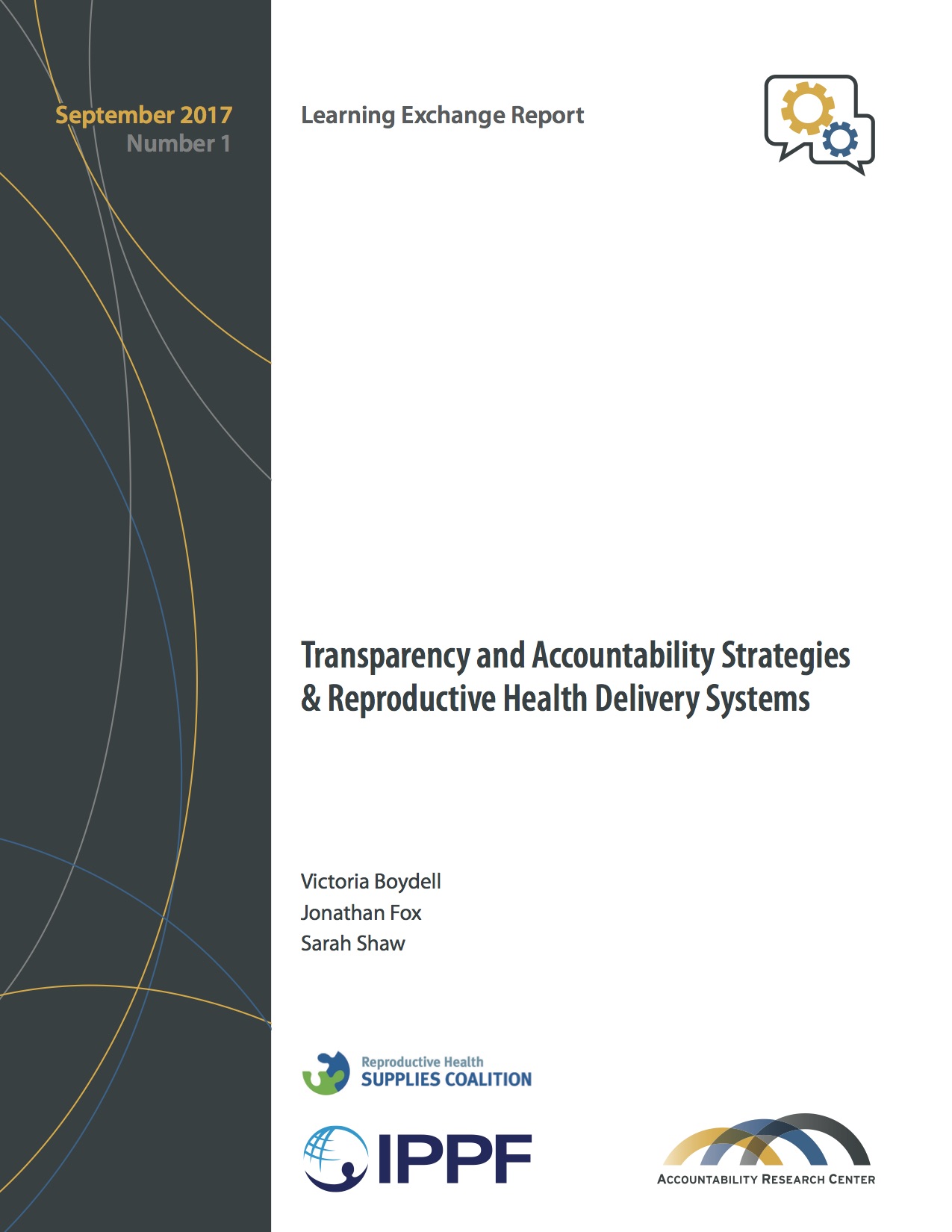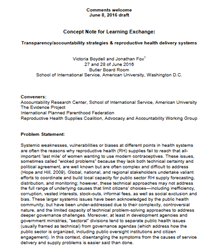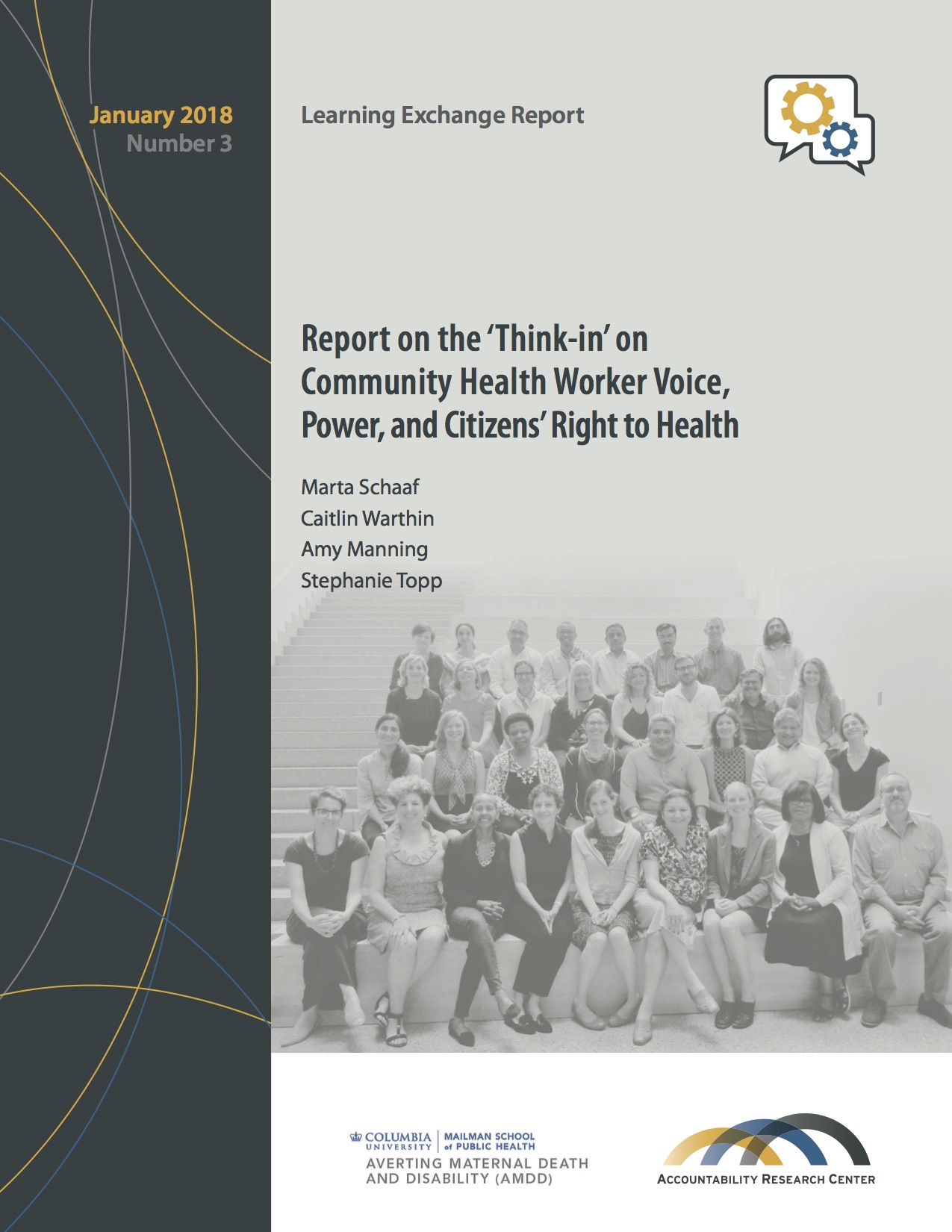
Transparency and Accountability Strategies & Reproductive Health Delivery Systems
Date: September 2017
Authors: Victoria Boydell, Jonathan Fox, Sarah Shaw
Publication type: Learning Exchange Report
Published by: Accountability Research Center, International Planned Parenthood Federation, Reproductive Health Supplies Coalition
This June 2016 Learning Exchange held at American University in Washington, D.C. convened over 40 practitioners and researchers to discuss potential contributions from the field of Transparency, Participation and Accountability (TPA) to the performance of reproductive health (RH) delivery systems. The conversation focused on how strategic citizen oversight initiatives can facilitate monitoring of reproductive health systems and promote more accountable health systems. The main themes that emerged through the panel presentations and subsequent discussions were:
- Include multiple perspectives: Bridge political and technical analysis, the first mile, and downward accountability
- Re-politicize RH supply chains: Map power, identify incentives and collective action opportunities
- Integrate research and practice across TPA and RH: Implementation science and action research
- Anticipate challenges of applying TPA principles to RH delivery systems
The Learning Exchange culminated with discussion on possible areas of relevant collaborative research. The Learning Exchange and this document are intended to spur cross-field collaboration, practice and learning.
“While great progress has been made in placing the women at the center and delivering rights based RH services, there is still something missing if women are still perceived as ‘recipients’ or ‘beneficiaries.’ A more comprehensive definition of the ‘last mile’ as ‘first mile’ would reemphasize downward accountability—from donors, governments and providers to the women they are responsible for serving, recognizing the role of choice, agency and empowerment in contraceptive choice.” -Learning Exchange Participant
Victoria Boydell Victoria Boydell is the Rights and Accountability Advisor for the Evidence Project/IPPF, a USAID-funded initiative to improve family planning policies, programs, and practices worldwide. Before joining the Evidence Project, she oversaw global monitoring and reporting for the Fund for Gender Equality at UN Women and held a range of positions at the International Planned Parenthood Federation. She has over 15 years’ experience in the field of family planning, reproductive health and gender equality. Her research has addressed such reproductive health issues as contraceptive use, provider-client interaction and patient centered quality of care. She works on community participation and engagement in sexual and reproductive health programs and developing new methodologies for measuring health facility adherence to rights based programming. Jonathan Fox Jonathan Fox is a professor in the School of International Service at American University. He studies the relationships between accountability, transparency and citizen participation. He is the director of the Accountability Research Center. His most recent publications include articles in World Development and the IDS Bulletin, and reports published by Making All Voices Count, U4: Anti-Corruption Resource Center and the Transparency and Accountability Initiative. His books include Accountability Politics: Power and Voice in Rural Mexico (Oxford 2007) and Mexico’s Right-to-Know Reforms: Civil Society Perspectives (co-editor, Fundar/Wilson Center 2007). He was a founding member of the International Expert Panel of the Independent Reporting Mechanism of the Open Government Partnership and currently serves on the boards of directors of Fundar (Mexico) and the Bank Information Center (DC). For online publications, see http://jonathan-fox.org/. Sarah Shaw Sarah Shaw has been an advocate for RH supplies for the last 14 years, working globally and supporting national partners. Whilst working at the International Planned Parenthood Federation she coordinated a series of national advocacy projects, supporting local organizations in Africa and Asia to advocate for improved policy and funding for SRHR. Between 2007–10 she coordinated Project RMA—supporting national networks to advocate for increased funding for contraception and reform of national commodity security groups, essential medicines lists and nanc- ing mechanisms. She has also administered a small grants fund for national and subnational advocacy. Focus then shifted to the global level, coordinating civil society participation in the review processes for the International Conference on Population and Development. She now represents Marie Stopes International as head of advocacy and supporting national advocacy in East and Southern Africa to increase access to safe abortion and contracep- tion services. She has been an active member of the Reproductive Health Supplies Coalition since 2007 and co- chaired the Advocacy and Accountability Working Group of the RHSC between 2013 and 2016.


